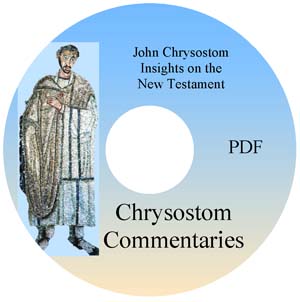
CD: John Chrysostom New Testament Commentary - PDF
 Be the first one to write a review
Be the first one to write a reviewAs most of our readers know, we do not recommend the use of modern commentaries. Thatís because the information in them is so often inaccurate and untruthful. At the same time, we recognize that many New Testament passages are difficult for the modern reader to understand. We donít speak the same language, we live in a very different culture, and so many changes have come into the church during the past 2000 years. It certainly would be handy to know how the early Christians understood various New Testament passages. more.
1 CD-ROM disc
$1.00
As most of our readers know, we do not recommend the use of modern commentaries. Thatís because the information in them is so often inaccurate and untruthful. Furthermore, the ďexplanationsĒ in them invariable reflect the biases of modern theology and attitudes. At the same time, we recognize that many New Testament passages are difficult for the modern reader to understand. We donít speak the same language, we live in a very different culture, and so many changes have come into the church during the past 2000 years. It certainly would be handy to know how the early Christians understood various New Testament passages.
Regrettably, no such commentary exists for the pre-Nicene period (A. D. 90-325). But the next best thing does exist. And that is the sermons of John Chrysostom (c. 390). Like other early Christians, Chrysostom preached by going through the Bible verse by verse. So his sermons on the New Testament give us the equivalent of a verse-by-verse commentary. Whatís more, his understanding of Scripture is usually very similar to the ante-Nicene Christian writers.
We donít have all of John Chrysostomís exegetical sermons on the New Testament, but happily, we have most of them: Matthew and John, Acts, and all of Paulís letters (including Hebrews). The Chrysostom New Testament Commentary contains his commentaries on all of these New Testament books in searchable PDF format. PDF bookmarks are placed throughout the text, making it easy to find any particular passage.
1 CD-ROM disc
To read David Bercotís complete introduction to this Commentary, click on introduction to John Chrysostom.